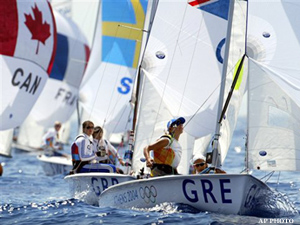
Sailing competition first took place at the 1900 Olympics, and sailing has been a part of every Olympics since 1908. This year the sailing events will take place on the Weymouth Bay, and out of Portland Harbor. Most of the races will take place around noon in Great Britain, so people in the United States should be able to watch them live with an early breakfast. The races will run from July 29 through Aug. 11. There will be competitions in eight disciplines of sailing, including single handed and double handed dinghy sailing, wind-surfing, and three person women's match racing. So here are five reasons to watch this year's Olympic sailing regardless of whether you are an avid yachtsman, or you've never even heard of a tiller.
Capsizing/Crashing
Sailing races can get feisty as the racers battle mother nature as much as their opponents, at times. The highly tuned dinghies that will race during the Olympics can topple with ease and anything from an a slight helm miscue to a sudden gust can lead to disaster. Just like any good NASCAR race, a sailing race will have a crash or two, or in this case, capsizes. There may not be flames and flying metal, but a sailboat capsize is nothing to laugh at, and in some races it might come down to the guy that stays upright that will win it all. Unlike a NASCAR crash, a capsize doesn't necessarily spell the end of the race. If a sailor can get their boat upright and racing quickly, he/she may still have a chance.
It ain't checkers, it's chess
While physical, sailing involves plenty of strategy and tactics throughout each race. During the start, mark roundings, legs, and finish, each boat will have to decide on the best course to take in relation to both their opponents and the wind, in order to complete the course the quickest. The boat which makes the best tactical decisions, along with sailing the most dexterously, will likely cross the finish first. And they don't have to do it in just one race, in order to take home a medal the best boats will have to sail consistently in a plethora of races, which will take place on multiple days in a variety of conditions. No one and dones here.
All Ages Involved
The youngest member of the Olympic U.S. Sailing Team, Sarah Lihan, is just 23, and competing in her first Olympics with Amanda Clark who competed in the 2008 games. At the age of 39, Brian Fatih is also sailing in his first Olympics with Mark Mendelblatt in the Star class, and they are the eldest group of the U.S. sailing contingent. Sailing is truly a lifelong sport, and the variety of ages of the competitor shows that easily. The younger competitors may have a physical leg up, but the elder sailors have a wealth of experience to give them a tactical advantage. Regardless of age, everyone has a shot to take home the gold.
Classiness Assured
Yachting as it was once called, remains a sport for ladies and gentleman with manners, the motorboating rif-raf need to apply. Much like golf or tennis, sailing prides itself in its rules, and the participants who uphold them. Sailors hold themselves to the rules and regulations, and race in a fair and respectful manner. The sailing community remains fairly small and tight knit, so many of the racers know each other well, both on and off the water.
The Gear
All of those guys and girls wearing Sperry topsiders this summer might just be trying to look cool, but for sailors those shoes serve a bigger purpose than style. Boating shoes give them traction on deck, and don't mark up their white boats. Sailors love their gear, along with their special shoes they usually rock sailing specific: gloves, glasses, hats, shorts, splashguards (waterproof shirts) and lifejackets. And that's just for a dinghy sailor. On a bigger boat the amount of gear multiplies quickly. The best, most technologically advanced gear not only helps a sailor's performance, it also makes them look sharp.
-- James Schleicher is a former Navy man, an avid yachtsman and the publisher of Horns Illustrated. Follow him on Twitter.




